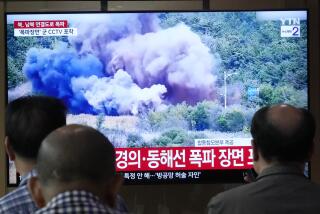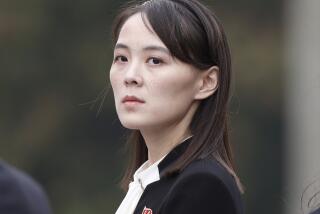N. Korea Says Explosion Was a Demolition
WASHINGTON — Offering North Korea’s first explanation for a mysterious explosion last week that raised fears of a nuclear weapons test, a top official of the reclusive communist state said early today that the massive blast was the deliberate demolition of a mountain as part of a hydroelectric project.
North Korean Foreign Minister Paek Nam Sun gave the details in response to a call for information by Bill Rammell, a British Foreign Office minister who is in Pyongyang, North Korea’s capital, the BBC reported.
First reports of the blast surfaced early Sunday and described a mushroom-shaped cloud several kilometers across -- raising fears that North Korea, which U.S. officials believe has enough weapons-grade plutonium for several bombs, had conducted its first atomic test.
On Sunday, Bush administration officials warned the communist government that detonating a nuclear weapon would be a serious political mistake but said the explosion did not appear to be an atomic test.
“We’ve seen reports of this explosion, but based on all the information that we have, it was not any kind of nuclear event,” Secretary of State Colin L. Powell said on “Fox News Sunday.” “We’re trying to find out more about it and what exactly it was.”
South Korean officials said Sunday that there actually had been two blasts, the first at 11 p.m. Wednesday. The other was at 1 a.m. Thursday, the 56th anniversary of North Korea’s founding -- an occasion when the nation might show off any new technology.
The blasts were detected near China’s border by South Korean seismic sensors, which measured a tremor of 2.6 magnitude. But radiation monitors showed no signs of nuclear fallout, and officials said a test was unlikely.
“It would be absurd for the North to conduct a nuclear test near the Chinese border,” Chung Dong Young, head of South Korea’s national security council, said Sunday.
The blast or blasts occurred about six miles from the North’s Yongjori missile base, in a mountainous area off-limits to outsiders. The base has tunnels for storing, deploying and launching up to 20 medium-range Rodong missiles, according to the Center for Nonproliferation Studies in Monterey, Calif.
Several nuclear nonproliferation experts interviewed Sunday said the blasts could have been caused by an accident at the base, or at a mine or fuel depot.
“If this was a nuclear blast, we would have known about it,” said Joseph Cirincione, who heads the nonproliferation project at the Carnegie Endowment for International Peace.
The U.S., he said, uses technology that can detect minute amounts of radiation in the atmosphere, as well as seismic and visual analysis and satellite imagery that would corroborate any kind of nuclear test.
North Korean officials revealed in October 2002 that the country had restarted its nuclear program, which it had pledged to halt in 1994 in return for fuel oil and two light-water reactors to produce electricity.
Recent talks to persuade North Korea to end its nuclear program in return for aid and security guarantees have stalled.
Sen. Pat Roberts (R-Kan.), chairman of the Senate Select Committee on Intelligence, said on CNN’s “Late Edition” that the panel would receive a classified briefing on the event this week.
Roberts said he had received mixed reports on whether the blast was a nuclear test. But he said the event only deepens his concern that North Korean leader Kim Jong Il appeared to be developing nuclear weapons and trying to use them to manipulate the U.S. and the other countries -- South Korea, China, Japan and Russia -- engaged in the negotiations with the North.
Powell would not say if he believed the North was conducting such a test. But he said administration officials were closely monitoring activities at a possible nuclear test site.
National security advisor Condoleezza Rice warned on “Late Edition” that North Korea “would make a very bad mistake” by exploding a nuclear weapon, which would polarize China, “with which they have a lot at stake.”
Asked whether the U.S. would consider intervening militarily if North Korea tested a nuclear weapon, she said, “The president never takes any option off the table, but we believe that the way to resolve this is diplomatically.”
Cirincione said he believed that such a test was likely. “I keep expecting one,” he said. “They often take these kinds of provocative actions when they think it would improve their negotiation position.”
The danger in detonating such a device, he said, was that it could set off a nuclear arms race across Asia. China and Russia are already nuclear powers.
“South Korea, Japan and Taiwan all have the nuclear ingredients and know-how to build nuclear weapons if they want to,” he said. “A North Korea test could cause them to reexamine their options.”
*
Jinna Park of The Times’ Seoul Bureau contributed to this report.
More to Read
Sign up for Essential California
The most important California stories and recommendations in your inbox every morning.
You may occasionally receive promotional content from the Los Angeles Times.










